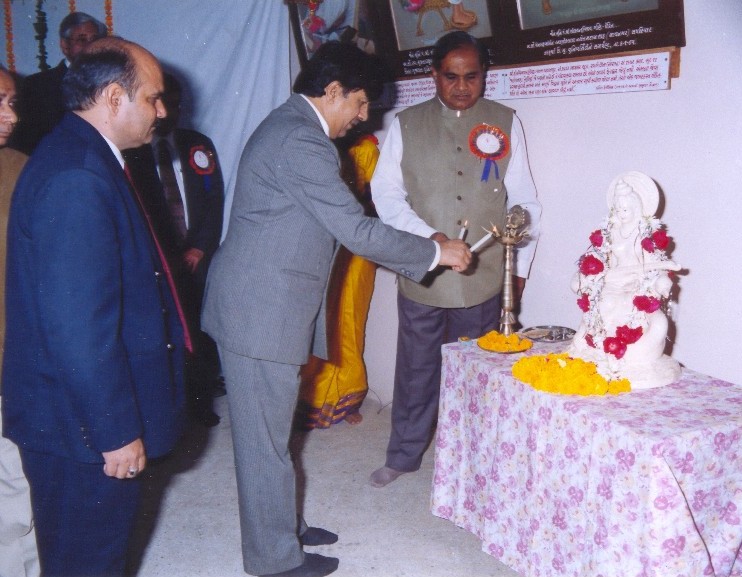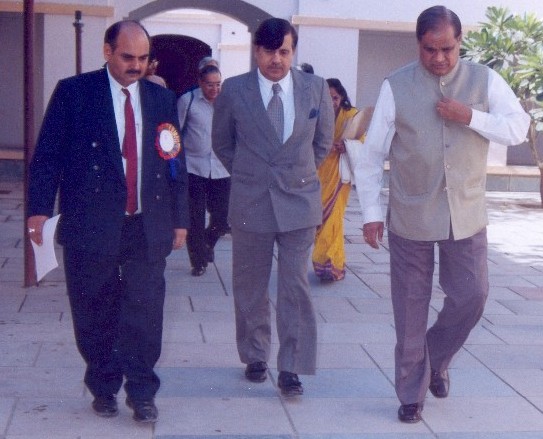|
Seminar
Organized :
International Seminar on
"Indian
Diasporic Experience : History, Culture and Identity"
(December 22-24, 2002) |
 |
|
|
Shri
J.C. Sharma Hon'ble secretary, Ministry of External Affairs,
Government of India, NEW DELHI.
Inaugurating
The International Seminar on
Indian
Diasporic Experience : History, Culture and Identity
|
|
|
 |
|
|
The
Coordinator of the Centre Dr. Adesh Pal(to the left) along with
Shri J.C. Sharma(in the middle) and Former Vice Chancellor Dr.
B.S.Jani(to the right)
|
The term ‘diaspora’, originally used for the Jewish externment from its homeland, is now applied as a “metaphoric designation” for expatriates, refugees, exiles and immigrants. It refers to the work of exile and expatriates and all those who have experienced unsettlement and dislocation at the political, existential or metaphorical levels. Significantly enough, the
Diaspora Indian writing in English covers every continent and part of the world. It is an interesting paradox that a great deal of Indian writing in English is produced not in India but in widely distributed geographical areas of indenture (‘Girmit’) i.e. Indian
Diaspora in the South Pacific, the Caribbean, South Africa, Mauritius, and the contemporary Indian
diasporas in the U.S.A., the U.K., Canada and Australia. Frankly speaking the very idea of “India” needs to be understood properly when contextualized in the backdrop of cultural study of the Indian
Diaspora. Given the context does “India” mean a nation – state or a larger civilizational identity? And, if it connotes “South Asia”, then how do South Asian diasporans articulate themselves today? These are certainly the issues which deserve serious attention.
With more and more writers of Indian origin settling abroad and engaging themselves in creating writing in the countries of their domicile, the theoretical problem is that of the critical parameters by which their works have to be defined and assessed. Although there are certain common resonances in the literary representations of the experience of the writers of the ‘indenture’ and the ‘new’ Indian diaspora, the responses and the narratives of the individual writers vary greatly. Writers like A.K. Ramanujan, Agha Shahid Ali,Bharati Mukherjee, David Dabydeen, M.G. Vassanji, Meena Alexander, Rohinton Mistry, Salman Rushdie, Satendra Nandan, V.S. Naipaul, to mention a few, differ from each other not only in their socio-cultural backgrounds and literary ancestries but also in their thematic preoccupations and literary styles. Further, the responses of the diasporic writers to India are also varied and not always adulatory; they range from sentimentality and nostalgia to a cynical celebration of their coming of age. However, their diasporic condition, their sense of exile and alienation and their efforts to seek replenishment by making symbolic returns to their origins bind all this writing into a unity. The theoretical and literary possibilities of the writings of Indian diaspora are immense and need to be discussed through this conference. Therefore, issues the conference shall debate among others are :
-
Nature of the diasporic aesthetics of the writers of Indian diaspora in order to theorize the literature of Indian
diaspora,
-
History : its erasure, construction and reconstruction,
-
Socio-political and cultural transformation; acculturation, adaptation, accommodation and integration in the diasporic communities,
-
The question of self/ identity in the diasporic experience ; cultural identity crossed by class, gender and ethnicity,
-
Religion and
Diaspora
-
Linguistic challenges and opportunities in the diasporic communities,
-
The diasporic experience in its various contexts,
-
Inter-cultural impact on the creative sensibility of the writers and to identify the
nature of their acceptance in the literary tradition of the host countries,
-
Elements and features of the writers of the Indian
Diaspora that mark them off from other minority / diasporas writers living in the countries of their residence,
-
Economics of
Diaspora,
-
Diaspora
and the transfer of technology architecture, music & arts,
-
Gujarati
Diaspora and
-
Punjabi
Diaspora.

|